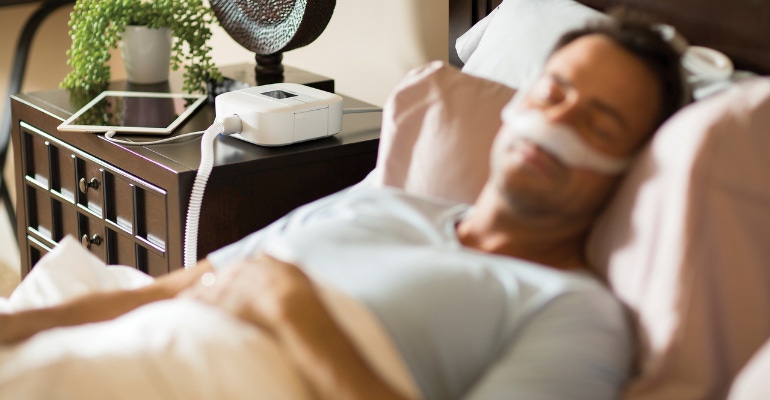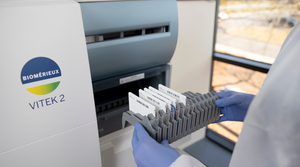Philips Hit with Criminal Complaint in France
More than 200 people filed a criminal complaint in France last week in connection with Phillips' ongoing respiratory device recall.
June 20, 2023

Philips has been accused of involuntary manslaughter in a complaint filed in France late last week over faulty respiratory devices, including machines used for sleep apnea patients.
More than 200 people filed a complaint in France late last week, accusing the company of deceptive business practices, endangering the lives of others, and administering harmful substances, according to their lawyer, Christophe Lèguevaques. Three of the plaintiffs are accusing Philips of involuntary manslaughter, Lèguevaques said.
Dubbing the scandal "Respiratorgate," Lèguevaques slammed the Amsterdam, Netherlands-based company in a press release Friday.
"For the record, the Dutch giant Philips is being implicated for placing on the market respiratory assistance devices that are dangerous to health due to the polyurethane foam used to soundproof the interior of the machines – a double blow to their users as these individuals suffer from sleep apnea or respiratory insufficiency," Lèguevaques said. "However, a number of factors tend to prove that Philips was aware of the problem since at least 2008 without ever deeming it necessary to take any corrective measures."
The complaint in France was filed almost exactly two years after Philips Respironics first announced its recall of millions of continuous positive airway pressure (CPAP), bi-level positive airway pressure (BPAP), and mechanical ventilator devices. Most of the affected devices are in the company's first-generation DreamStation product family. The impetus behind the recall stems from the fact the foam used to dampen the machines’ sound can degrade and emit small particles that irritate airways. Gases released by the degrading foam may also be toxic or carry cancer risks, the company warned at the time that the recall was initiated in June 2021.
In connection to the recalled devices, Philips Respironics is a defendant in several lawsuits and claims, including the recently filed complaint in France. As litigation is in preliminary stages, Steve Klink, head of Philips' press office, told MD+DI it is too early to draw any conclusions or provide further comments.
"Philips Respironics is committed to patient safety and quality, and we regret the challenges our voluntary field safety notice is causing patients and customers," Klink said. "We are working hard to repair or replace affected sleep and respiratory care products as quickly as possible."
Klink said that Philips, along with five certified, independent testing laboratories in the United States and Europe and other third-party experts, is conducting a comprehensive test and research program on the PE-PUR sound abatement foam to better assess and scope the potential health risks.
"The extensive data and results now available for sleep therapy devices are positive and reassuring," Klink said. "Results for the first-generation DreamStation, System One, and DreamStation Go devices indicate that the occurrence of visible foam degradation is low and volatile organic compounds and particulate emissions related to foam degradation are within the applicable safety limit and are unlikely to cause appreciable harm to health in patients."
He also noted that based on 13 third-party epidemiological studies identified from a systematic literature review, no association has been established between use of CPAP devices, including Philips' CPAP devices, and risk of cancer in patients with obstructive sleep apnea. These include two rigorous independent studies that have shown no statistical difference in cancer risk between sleep apnea patients who used Philips Respironics devices versus other brands of devices, Klink said.
Since April 2021, FDA has received more than 105,000 medical device reports, including 385 reports of death, reportedly associated with the PE-PUR foam breakdown or suspected foam breakdown.
In a May 2022 email to Philips, Malvina Eydelman, MD, points to evidence that Philips was aware of that the PE-PUR foam was susceptible to degradation for years prior to the June 2021 recall. Eydelman is the director of the Office of Ophthalmic, Anesthesia, Respiratory, ENT, and Dental Devices within FDA's Office of Product Evaluation and Quality Center for Devices and Radiological Health.
"Testing conducted for Philips in 2016 also determined that the PE-PUR foam was susceptible to degradation, resulting in the conclusion at that time that 'polyester urethanes show bad resistance against high humidity in combination with high temperature.' Other testing conducted for Philips in 2016 determined that, compared to PE-PUR foam, another type of foam, polyether urethane, 'show[s] a far better resistance against high humidity at high temperature.' Philips continued manufacturing products containing PE-PUR foam and did not take steps to initiate a corrective action until April 2018, with no formal [corrective and preventative action] initiated until June 2019."
About the Author(s)
You May Also Like



